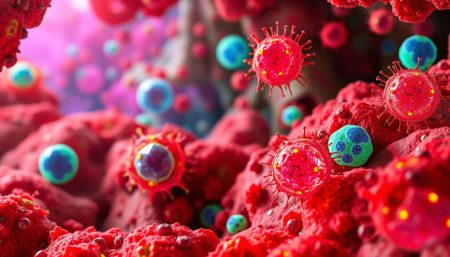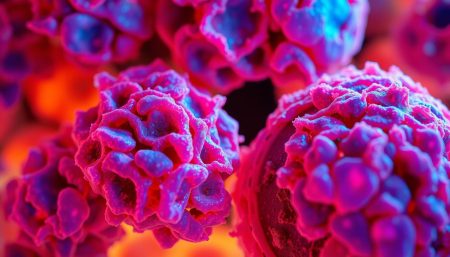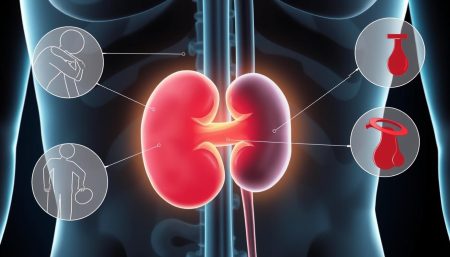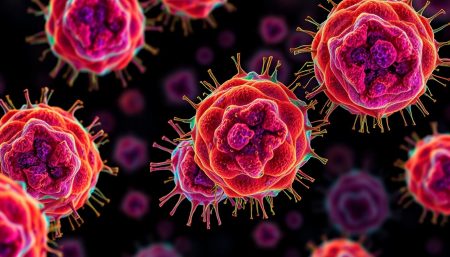When you get a cancer diagnosis, it can feel like you’re lost in a maze of treatment choices. CAR T-cell therapy is a new hope for those who haven’t found relief with traditional treatments. It’s a choice between CAR T-cell therapy vs chemotherapy, two very different ways to fight cancer. We’ll explore how they work and how effective car t cell therapy is in finding a cure.
Finding the right cancer treatment options is a personal and tough journey. It’s about seeking knowledge to guide you through the medical world. Our goal is to help you understand your choices, so you can make a decision that’s right for you.
Key Takeaways
- Comprehensive insight into the landscape of CAR T-cell therapy vs chemotherapy.
- A keen understanding of the effectiveness and potential of car t cell therapy.
- Evaluation of cancer treatment options, tailored to individual patient needs.
- Empowerment through knowledge, enabling informed decisions in cancer care.
- A balance of medical expertise with an empathetic approach, addressing the human aspect of cancer treatment.
- Guidance towards relevant and accurate information in the selection of an appropriate therapy.
Introduction to CAR T-Cell Therapy
CAR T-cell therapy is a new way to fight cancer. It uses the body’s immune system to attack cancer cells. This method is especially good at treating blood cancers.
What is CAR T-Cell Therapy?
What is CAR T-cell therapy? It’s a treatment that changes T-cells to fight cancer. T-cells are part of our immune system. This therapy is made just for each patient, making it very personal.
How Does CAR T-Cell Therapy Work?
The car t cell therapy procedure starts by taking T-cells from a patient. Then, these T-cells are changed to find and kill cancer cells. This way, the treatment is precise and doesn’t harm healthy cells as much.
Types of Cancers Treated with CAR T-Cell Therapy
CAR T-cell therapy works well on some blood cancers. It helps with:
- Acute Lymphoblastic Leukemia (ALL)
- Chronic Lymphocytic Leukemia (CLL)
- Non-Hodgkin Lymphoma (NHL)
- Multiple Myeloma (MM)
| Cancer Type | Response Rate |
|---|---|
| Acute Lymphoblastic Leukemia | Up to 90% |
| Chronic Lymphocytic Leukemia | Up to 71% |
| Non-Hodgkin Lymphoma | Up to 83% |
| Multiple Myeloma | Up to 85% |
More research could lead to using CAR T-cell therapy for other cancers. This could bring hope to many fighting cancer.
Overview of Chemotherapy
Chemotherapy is a key part of traditional cancer treatment. It fights cancer by targeting cells that grow fast. This treatment is vital for understanding cancer care.
What is Chemotherapy?
Chemotherapy uses drugs to kill cancer cells. These drugs stop cancer cells from growing and spreading in the body.
How Chemotherapy Works
Chemotherapy drugs work by stopping cancer cells from dividing. This is key to making chemotherapy more effective. It’s especially important when surgery or radiation isn’t enough.
Common Types of Chemotherapy Drugs
Chemotherapy drugs are sorted by how they work. Here’s a table showing some common ones:
| Drug Category | Examples | Usage |
|---|---|---|
| Alkylating Agents | Cyclophosphamide, Melphalan | Often used to treat a wide range of cancers including lymphoma and breast cancer |
| Antimetabolites | Methotrexate, 5-FU | Effective in treating leukemias and cancers of the breast and ovary |
| Anti-Tumor Antibiotics | Doxorubicin, Bleomycin | Used to treat several types of cancer, including Hodgkin’s and non-Hodgkin’s lymphoma |
| Topoisomerase Inhibitors | Irinotecan, Topotecan | Used mainly for colorectal, ovarian, and lung cancers |
| Plant Alkaloids | Vincristine, Vinblastine | Commonly employed in the treatment of leukemia, lymphoma, and myeloma |
This variety of chemotherapy drugs helps tailor treatments. It makes the disease more manageable and effective.
New treatments like CAR T-cell therapy are changing cancer care. They target cancer cells more precisely. This reduces the impact on healthy cells compared to traditional chemotherapy.
Key Differences Between CAR T-Cell Therapy and Chemotherapy
In the world of cancer treatment, CAR T-cell therapy and chemotherapy stand out. They differ in how they work, how they are given, and the side effects they cause. This part will explore these differences and how personalized medicine improves care for patients.
Mechanism of Action
CAR T-cell therapy uses the body’s immune cells to fight cancer. It changes these cells to target cancer cells only. This is a big difference from chemotherapy, which attacks all fast-growing cells, including healthy ones.
Treatment Administration
CAR T-cell therapy usually involves a few infusions of the modified cells. Chemotherapy, on the other hand, needs a regular schedule of treatments. This affects how patients feel during treatment and their daily life.
Side Effects Comparison
The side effects of CAR T-cell therapy can be severe but are mostly short-term. Chemotherapy side effects can last longer and vary, from mild to severe. This includes things like nausea and hair loss, and even serious infections.
| Treatment Type | Side Effects Nature | Impact Timing |
|---|---|---|
| CAR T-Cell Therapy | Acute, possibly severe | Concentrated post-infusion |
| Chemotherapy | Broad, varies in severity | Prolonged throughout treatment |
Effectiveness of CAR T-Cell Therapy
New ways to fight cancer have made a big difference, and CAR T-cell therapy is a big step forward. It’s a new way to treat blood cancer that has shown great results. This therapy has brought hope to many by improving survival and remission rates.
Success Rates in Treating Blood Cancers
CAR T-cell therapy works well against many blood cancers. It has shown great success in clinical trials and real-world use. This therapy has led to high remission rates in diseases like acute lymphoblastic leukemia (ALL).
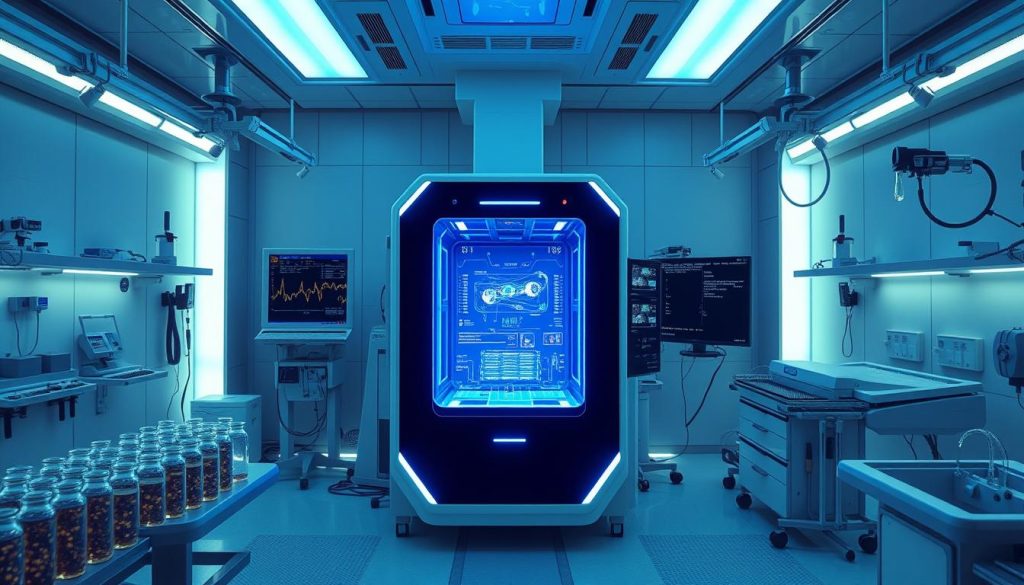
Research shows that many patients stay in remission for a long time. This means they don’t just get temporary relief but often find long-term solutions to their cancer. This makes CAR T-cell therapy a powerful tool against blood cancer, changing lives for the better.
Long-term Outcomes for Patients
Long-term results for CAR T-cell therapy patients are encouraging. They show lasting health gains and fewer relapses. This therapy offers hope for long-lasting remission and a better life. Many patients stay in remission for years, showing the therapy’s lasting impact.
The big success of CAR T-cell therapy highlights the need for new treatments. It shows how these therapies can change cancer care. As research continues, these treatments could set new standards in treating cancer.
Effectiveness of Chemotherapy
Understanding how well chemotherapy works against cancer is complex. It involves looking at chemotherapy success rates, what affects these rates, and the path to cancer remission. This helps us see how important chemotherapy is in fighting cancer.
Success Rates for Common Cancers
Chemotherapy is key in cancer treatment, but its success varies by cancer type. Knowing how well chemotherapy treatment effectiveness works is crucial for patients.
| Cancer Type | 5-Year Survival Rate (%) | Chemotherapy Impact |
|---|---|---|
| Breast Cancer | 90 | High |
| Lung Cancer | 56 | Moderate |
| Colorectal Cancer | 64 | Significant |
Factors Influencing Efficacy
Many things affect how well chemotherapy works. Knowing these can help make treatment plans more effective. This leads to better chances of cancer remission and better care for patients.
- Stage of Cancer at Diagnosis
- Overall Health of the Patient
- Type of Chemotherapy Drugs Used
These factors help make chemotherapy treatments more personalized. They aim to increase chemotherapy success rates and improve patient outcomes in the battle against cancer.
Patient Eligibility for CAR T-Cell Therapy
To find out if someone can get CAR T-cell therapy, doctors use strict rules and genetic tests. These steps make sure the treatment is safe and works well for cancer patients.
Criteria for Selection
The patient selection for CAR T-cell therapy is very careful. It’s for those who haven’t gotten better with usual treatments. Car T cell therapy eligibility mainly includes patients with certain blood cancers. These are cancers like acute lymphoblastic leukemia or diffuse large B-cell lymphoma that haven’t responded to other treatments.
Importance of Genetic Testing
Genetic testing is key in picking patients for CAR T-cell therapy. It looks at a patient’s genes to see if they’ll likely do well with the therapy. This genetic testing for cancer treatment helps make treatment plans that fit each patient better. It also makes it more likely that the treatment will work.
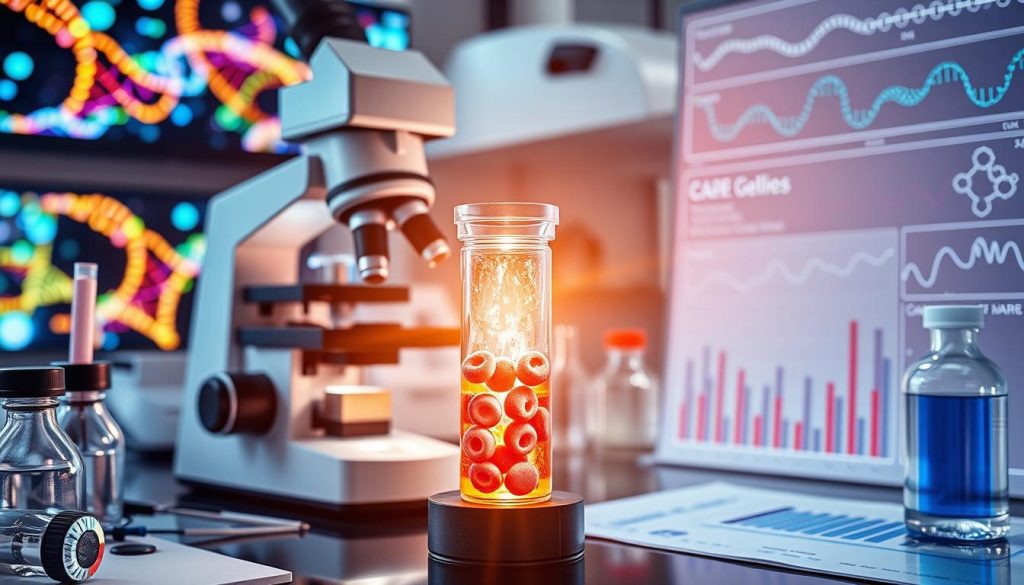
| Criteria | Description |
|---|---|
| Type of Cancer | Must be certain blood cancers like acute lymphoblastic leukemia or diffuse large B-cell lymphoma. |
| Previous Treatments | Patient must have undergone standard treatments without success. |
| Genetic Markers | Presence of specific genetic markers that indicate likely responsiveness to CAR T-cell therapy. |
| Overall Health | Good enough health to handle potential side effects and the demanding nature of the treatment. |
Patient Eligibility for Chemotherapy
To find out if someone can get chemotherapy, doctors look at many things. They check the person’s health, the type of cancer, and how far it has spread. This helps doctors create a treatment plan that fits each patient’s needs.
Factors Considered for Chemotherapy
Doctors carefully check many things before deciding on chemotherapy. They look at the patient’s current health and past treatments. They also consider any ongoing health issues and how well the patient can handle chemotherapy’s side effects.
The goal is to make the treatment work well without causing too many problems. This helps the patient get better while staying safe.
Special Cases in Chemotherapy Administration
Some patients need special care when getting chemotherapy. This includes those with chronic illnesses like diabetes or heart disease, and pregnant women. Doctors adjust the treatment to keep everyone safe and make sure it works.
These changes help make sure each patient gets a treatment plan that’s just right for them. This way, they can recover better while avoiding risks.
- Initial patient evaluation to assess overall health
- Risk assessment related to existing health issues
- Adjustments in dosages or treatment protocols for vulnerable groups
When planning cancer treatment, it’s key for doctors to talk a lot with their patients. They discuss what might happen, how to keep an eye on health, and any changes to the treatment. This makes sure each patient gets the best care that fits their unique situation.
Side Effects of CAR T-Cell Therapy
CAR T-cell therapy has changed the game for some cancers. But, it’s important to talk about the car t cell therapy side effects patients might face. Knowing these side effects and how to manage treatment reactions helps make therapy better and more comfortable for patients.
Common Side Effects
Using CAR T-cell therapy as a form of immunotherapy comes with its own set of challenges. One big issue is Cytokine Release Syndrome (CRS). This happens when the body’s immune system overreacts to the CAR T-cells. Symptoms can range from mild like fever and tiredness to serious issues like low blood pressure and brain problems.
Other immunotherapy side effects include:
- B-cell aplasia
- Tumor lysis syndrome
- Neurological effects
- Autoimmune reactions
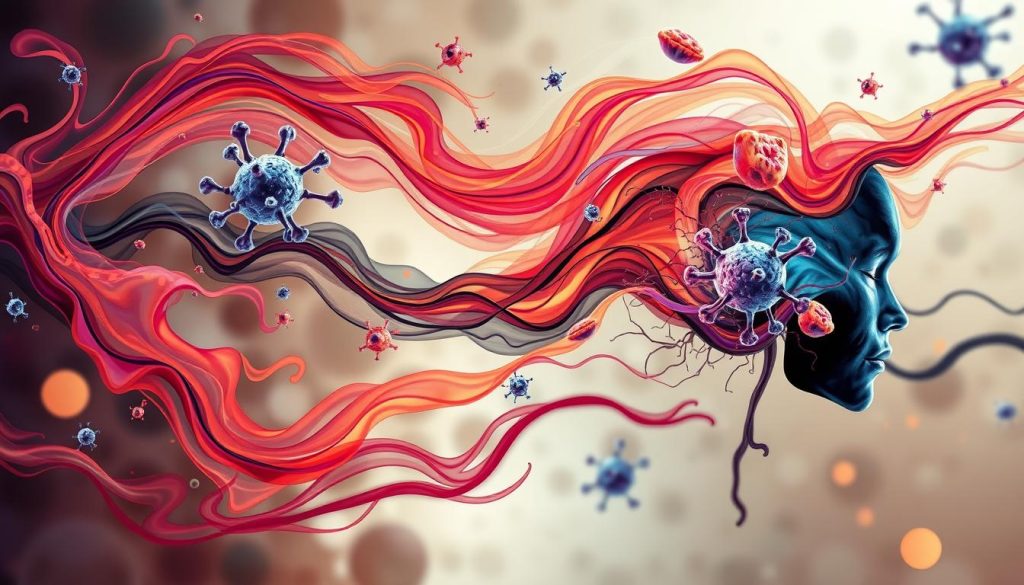
Managing Adverse Reactions
It’s vital to manage treatment reactions well for patients getting CAR T-cell therapy. Doctors keep a close eye on patients for any bad reactions after the treatment. They’re ready to use treatments like steroids or tocilizumab to help with severe CRS.
Supportive care is also key. This includes:
- Hydration and electrolyte balance
- Pain management strategies
- Regular neurological assessments
- Emotional and psychological support
A well-informed team and clear guidelines for managing side effects are crucial. They help improve patient care and therapy results. This shows the need for ongoing research and better ways to handle immunotherapy side effects.
Side Effects of Chemotherapy
Chemotherapy is a common treatment for many cancers. It uses chemicals to kill cancer cells. But, it can also cause chemotherapy side effects, which can be mild or severe. Knowing about these side effects helps in managing them better.
Common Side Effects
- Nausea and vomiting
- Hair loss
- Fatigue
- Increased risk of infections due to reduced white blood cell count
- Mouth sores
- Changes in appetite
These side effects can make daily life tough. But, doctors have many ways to help manage them.
Long-term Risks
Chemotherapy can also cause long-term health problems. These can show up years later. Issues like secondary cancers, heart problems, and kidney damage are possible. These are due to the long-term effects of cancer treatment.
| Side Effect | Potential Long-term Impact |
|---|---|
| Chemotherapy-induced Cardiomyopathy | Heart health deterioration which may require ongoing treatment and diet changes |
| Renal Damage | Possibility of chronic kidney disease or long-term renal therapy requirement |
| Secondary Malignancies | Increased risk of developing a new form of cancer, different from the original cancer treated |
Even with these risks, chemotherapy is still a key part of cancer treatment. Proactive management of side effects and watching for long-term issues can help patients live well during and after treatment.
Cost Considerations
When looking at cancer treatment options, money matters a lot. Both CAR T-cell therapy and traditional chemotherapy are pricey. Knowing these costs helps families plan for the financial side of cancer care.
Financial Implications of CAR T-Cell Therapy
The cost of CAR T-cell therapy depends on several things. These include the procedure’s complexity, hospital fees, and aftercare needs. This treatment is for cases where other treatments have failed, which affects its price. Car t cell therapy cost can be quite high, more than usual cancer treatments, because it’s tailored and uses advanced tech.
Cost Analysis of Chemotherapy
On the other hand, chemotherapy expenses depend on the drugs used, how long treatment lasts, and how often it’s needed. While cheaper than CAR T-cell therapy, chemotherapy costs can add up over time. It’s key to compare these costs to understand cancer treatment affordability.
| Treatment Type | Average Cost | Duration |
|---|---|---|
| CAR T-Cell Therapy | $350,000 – $475,000 | Short-term |
| Chemotherapy | $10,000 – $20,000 (per cycle) | Long-term |
Patients need to think about the direct costs of treatments and how they’ll affect their finances long-term.
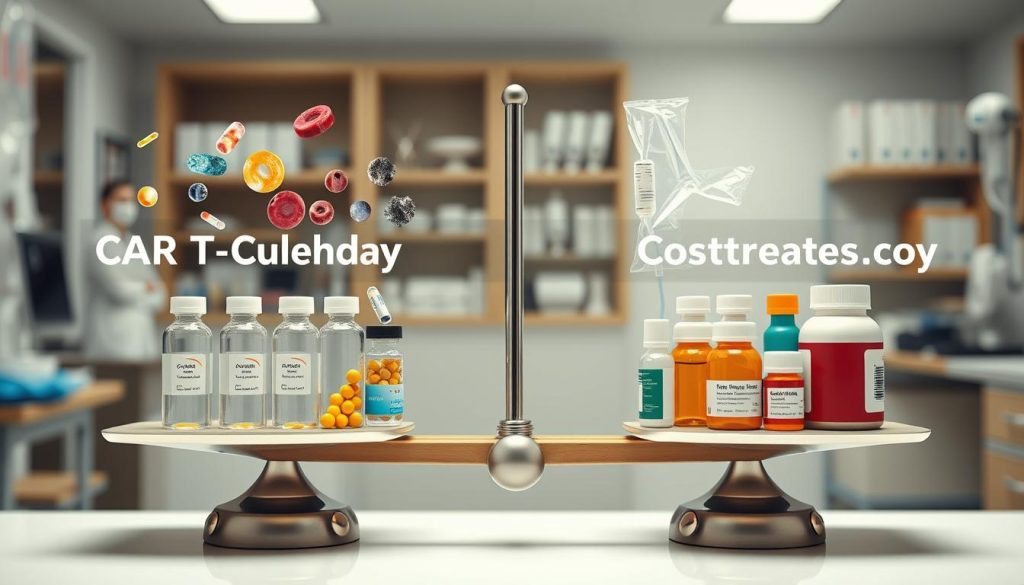
Recovery and Rehabilitation
After treatments like CAR T-cell therapy and chemotherapy, patients start the important journey of post-treatment recovery and rehabilitation services. These steps are key to improving quality of life post-cancer treatment and keeping health on track.
Recovery Timeline for CAR T-Cell Therapy
The recovery time for CAR T-cell therapy changes for everyone. First, patients watch for and manage any quick side effects. Then, they slowly get their immune system back and health improves. With the right rehabilitation services, patients can get back to normal life and enjoy better health.
Rehabilitation After Chemotherapy
Rehab after chemotherapy is about fixing both body and mind. It might include physical therapy to fight fatigue and muscle loss, nutrition plans to build strength, and mental health support. These services help patients regain their strength and improve their overall health.
The table below shows the usual recovery and rehabilitation phases after CAR T-cell therapy and chemotherapy:
| Treatment Type | 0-3 Months | 4-6 Months | 7+ Months |
|---|---|---|---|
| CAR T-Cell Therapy | Monitoring for immediate reactions, managing side effects | Immune system reinforcement | Return to regular activities, ongoing immune health checks |
| Chemotherapy | Post-chemo recovery, initiation of physical rehab | Nutritional support, continuation of physical therapy | Emotional well-being support, full return to prior activity levels |
This structured path to health shows why personalized post-treatment recovery plans are so important. They help cancer survivors get back to a happy, fulfilling life.
Emotional and Psychological Impact
Cancer treatment, including new therapies like CAR T-cell therapy, affects patients’ mental health. It’s important to offer psychological support for cancer patients for a full recovery.
Mental Health Effects of CAR T-Cell Therapy
CAR T-cell therapy is groundbreaking but brings mental health challenges. The treatment’s intensity and outcome uncertainty can cause stress, anxiety, and depression. It’s crucial to improve mental health after cancer therapy, as shown by a study on neuropsychiatric outcomes post-CAR-T cell therapy. Nearly half the patients faced emotional and cognitive issues.
Coping Mechanisms for Chemotherapy Patients
Chemotherapy patients need to manage their emotional side as much as physical side effects. Cognitive behavioral therapy, mindfulness, and support groups are key in coping with cancer treatment. Connecting with others facing similar challenges offers psychological relief and advice, building a supportive community.
Creating a support network with health care providers, psychologists, and peer groups is essential. This network ensures patients get the mental health care they need, supporting their overall well-being alongside physical treatment.
| Treatment Type | Common Emotional Impact | Recommended Support |
|---|---|---|
| CAR T-Cell Therapy | Anxiety, Uncertainty | Professional Counseling, Stress Management Sessions |
| Chemotherapy | Depression, Isolation | Peer Support Groups, Mindfulness Techniques |
Recognizing the need for emotional and psychological support is key. Tailored mental health strategies in cancer treatment improve patient resilience and outcomes. For those going through cancer treatment, addressing the psychological aspects is as crucial as the medical treatment itself.
Current Research and Advances
The world of cancer treatment is changing fast, thanks to latest cancer research and advances in cancer treatment. This section looks at the newest breakthroughs in CAR T-cell therapy and chemotherapy.
Innovations in CAR T-Cell Therapy
Among the innovative cancer therapies, CAR T-cell therapy is making big strides. New studies show better targeting and fewer side effects. This means cancer cells are being killed more precisely.
One big leap is the creation of dual-target CAR T-cells. These can attack more than one cancer antigen at a time. This makes them more effective against tough cancer cells.
To learn more, check out how CAR T-cell therapy is helping with hard-to-treat cancers like multiple myeloma. It uses the body’s immune system to fight cancer better than before.
Emerging Chemotherapy Treatments
Chemotherapy is also getting better, thanks to new research. The goal is to deliver drugs more precisely and reduce harm to healthy cells. For example, nanoparticles are being used to target cancer cells more accurately.
This helps reduce damage to healthy tissues and shortens recovery times. These improvements are key for better patient care and more personalized treatments.
In short, the latest cancer research and advances in cancer treatment in CAR T-cell therapy and chemotherapy are promising. They could make cancer easier to manage and treat in the future.
Conclusion
When we look at cancer treatment options, it’s clear how vital informed medical decisions are. It’s important for patients and their families to grasp the details of each treatment. This knowledge is key.
Making an Informed Decision
Choosing a cancer treatment is a personal journey. It involves looking at the latest medical breakthroughs and what’s best for your health. If you’re thinking about CAR T-cell therapy, knowing its benefits, risks, and if it’s right for you is crucial. Learn more about CAR T-cell therapy here
Consulting with Healthcare Professionals
For effective decision-making, getting healthcare guidance is a good idea. Talking to doctors and nurses can help clear up any confusion. It also helps patients and their families make choices that fit their needs.
Every step you take to learn and talk about options with your cancer team brings you closer to the right treatment. It’s about finding a plan that matches your health goals and what you prefer.
Resources for Patients and Families
Starting a fight against cancer is tough for patients and their families. Having good support can help a lot. It gives practical help and emotional comfort. This part of our article will help those affected by cancer find the right resources.
Support Groups for CAR T-Cell Therapy
Support groups are key for those getting CAR T-Cell Therapy. They offer a safe space to share, celebrate, and find comfort. It’s a place to connect with others who understand your journey.
These groups also share tips on dealing with side effects. They help make sense of this new treatment.
Educational Materials on Chemotherapy
Learning about chemotherapy is important for patients and families. These materials answer questions and explain treatment in simple terms. They help people feel more in charge of their health.
Understanding treatment can reduce worry. It prepares them for what’s ahead.
FAQ
Q: Is CAR T-cell therapy more effective than chemotherapy?
A: CAR T-cell therapy has shown great success in treating some blood cancers. It can lead to long-term remissions. Whether it’s better than chemotherapy depends on the cancer type and stage. Always talk to a healthcare professional for a personal assessment.
Q: What are the key differences between CAR T-cell therapy and chemotherapy?
A: CAR T-cell therapy targets cancer cells specifically, which might cause fewer side effects than chemotherapy. Chemotherapy affects both cancer cells and healthy cells. CAR T-cell therapy involves a single infusion of modified T-cells, while chemotherapy requires multiple cycles.
Q: What types of cancers are treated with CAR T-cell therapy?
A: CAR T-cell therapy is mainly used for certain blood cancers like lymphomas and leukemias. Research is ongoing to see if it can treat other cancers too.
Q: What are the eligibility criteria for CAR T-cell therapy?
A: To be eligible for CAR T-cell therapy, you must meet certain criteria. This includes the type and stage of your cancer, previous treatments, overall health, and genetic markers on your tumor cells. A medical team will evaluate you to see if you qualify.
Q: What are the typical side effects of CAR T-cell therapy?
A: Side effects of CAR T-cell therapy include cytokine release syndrome (CRS), fever, fatigue, headache, and neurological symptoms. There are strategies to manage these side effects and keep patients comfortable.
Q: How much does CAR T-cell therapy cost compared to chemotherapy?
A: CAR T-cell therapy is often more expensive than chemotherapy because it’s personalized and complex. Insurance, financial assistance programs, and individual circumstances affect the cost.
Q: What is the recovery process like after CAR T-cell therapy?
A: Recovery from CAR T-cell therapy varies. It involves monitoring for side effects and regular follow-ups. How quickly you feel better depends on your body’s response to the treatment.
Q: Can chemotherapy cause long-term health issues?
A: Yes, chemotherapy can lead to long-term health problems like heart, lung, or nerve damage, fertility issues, and secondary cancers. But, treatments are getting better to reduce these risks.
Q: How can the emotional and psychological impacts of cancer treatment be managed?
A: Managing the emotional and psychological effects of cancer treatment involves seeking help from mental health professionals and support groups. Mindfulness and healthy lifestyle changes can also help manage stress and anxiety.
Q: What are the latest advancements in CAR T-cell therapy and chemotherapy?
A: Recent CAR T-cell therapy advancements include research on solid tumors and reducing side effects. Chemotherapy is also evolving with more targeted drugs and combinations with other treatments to improve outcomes.












